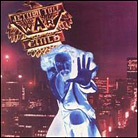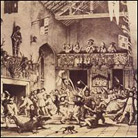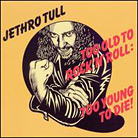February 2003
That’s not to say that Tull didn’t maintain a dedicated following. It remains a popular act to this day and enjoys steady play on classic-rock radio. Since that play is pretty much limited to tracks from Aqualung and a few other selections, we can revisit these three titles with fresh ears. They’ve been polished up and carefully remastered, with bonus tracks, and well-designed booklets that include photos and new liner notes by Ian Anderson. While some of the synthesizer sounds and double bass-drum rolls place this music firmly in the '70s, these recordings have aged surprisingly well. I was especially struck by Too Old to Rock'n'Roll, an album that didn’t grab me when it was originally released. Anderson combined his progressive-rock interests with solidly constructed songs to deliver a very enjoyable record. The title tune, which often sounded pompous as a single, makes more sense in context and its odd combination of defiance and melancholy is brought into sharper focus by the remastering, which gives David Palmer’s string arrangement more presence (much of what was good in these records was probably lost in bad vinyl ). Minstrel in the Gallery was the best received of these recordings at the time and it remains one of the band’s best efforts. It convincingly fuses English folk music with complex instrumental rock and gives Martin Barre, surely among the most under-rated guitarists of the classic-rock era, plenty of room to stretch out. The band maneuvers easily between quiet, acoustic-guitar-centered passages and more dynamic sections that expand on the musical themes stated in the tunes. "Baker St. Muse," a suite of folk-influenced songs that originally took up most of side two, is particularly effective at staying true to the older music style while integrating rock elements into the instrumental portions of the piece. In his liner notes to War Child, Anderson writes of that "At face value, the songs are whimsical…." Compared to A Passion Play, the album that preceded it, War Child might seem lighthearted, but it’s a sprawling, puzzling record, and the addition of seven previously unreleased selections from the same sessions only adds to the feeling that it lacks focus. Even on this disc, however, there are musical riches; it contains one of Anderson’s very best songs, "Skating Away on the Thin Ice of the New Day." There are pleasant surprises throughout, such as Anderson’s use of the alto and soprano saxes to punctuate some of the melody lines, or John Evan’s use of the piano accordion to suggest a sea shanty in "Queen and Country." I’m not sure I can sort out a concept for War Child beyond Anderson’s usual questions about life, death, and God -- better to just enjoy the interesting musical excursions it takes. The amount of detail revealed in these remastered versions probably makes them preferable to previously available versions, although I have only a vinyl copy of Minstrel in the Gallery for reference. Listening to these discs now made me wonder if youthful impatience caused me to ignore them the first time around. Much of the progressive rock at the time was so bombastic that these quieter albums may have been easy to pass by. I’m glad I had the chance to hear them again and revise my opinion. GO BACK TO: |
 Jethro Tull - War Child
Jethro Tull - War Child Jethro Tull - Minstrel in the Gallery
Jethro Tull - Minstrel in the Gallery Jethro Tull - Too Old to Rock'n'Roll: Too Young to Die!
Jethro Tull - Too Old to Rock'n'Roll: Too Young to Die! When these three records and
the one that preceded them, A Passion Play, were originally released, they marked a
change in the life of Jethro Tull. The band had enjoyed mostly cordial press from rock
critics of the time, but beginning with A Passion Play and continuing for these
three releases, reviewers began to accuse them of being pretentious and, worse, dull. Loyalists
hung on, but casual listeners, who had helped make Aqualung and Thick as a Brick
such successes, began to drift away.
When these three records and
the one that preceded them, A Passion Play, were originally released, they marked a
change in the life of Jethro Tull. The band had enjoyed mostly cordial press from rock
critics of the time, but beginning with A Passion Play and continuing for these
three releases, reviewers began to accuse them of being pretentious and, worse, dull. Loyalists
hung on, but casual listeners, who had helped make Aqualung and Thick as a Brick
such successes, began to drift away.